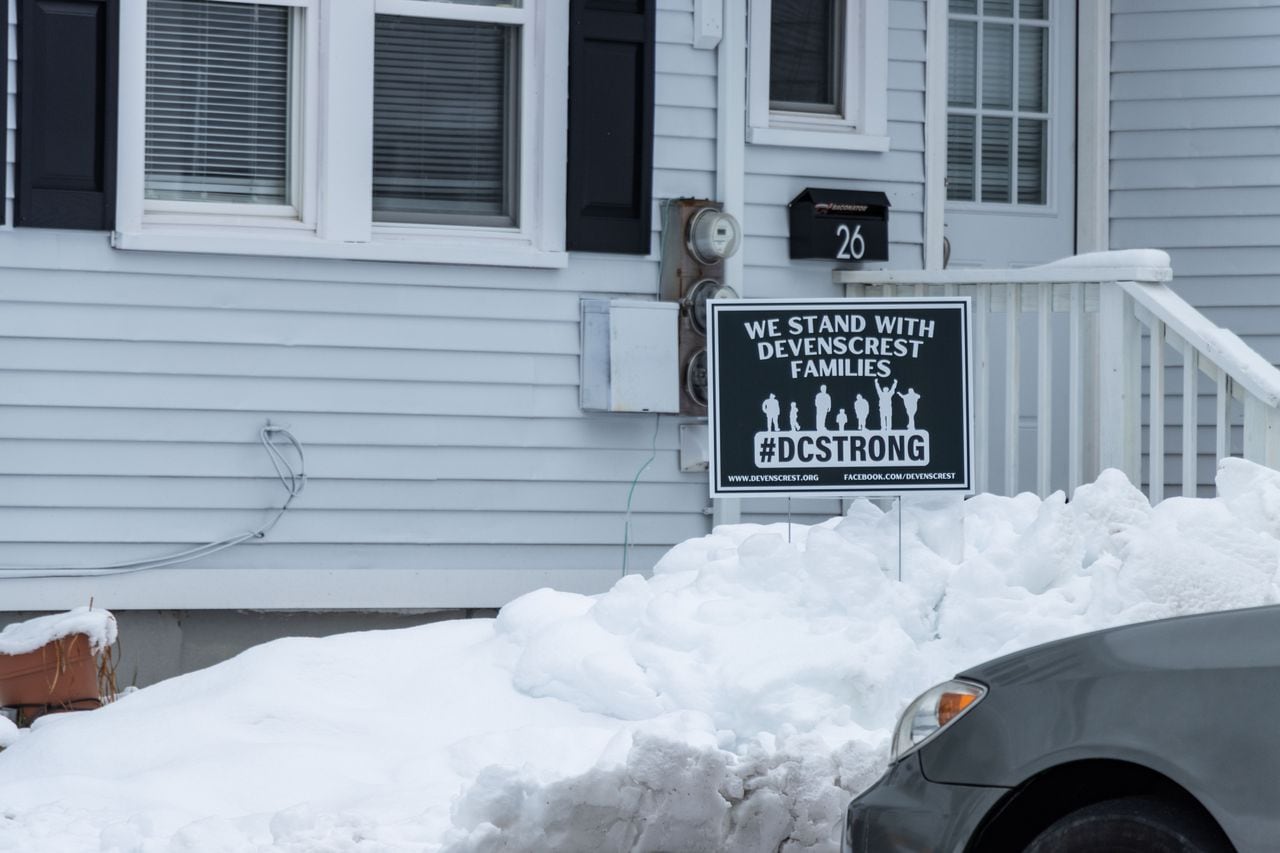
When D-Amber Houle moved into Devenscrest Village in Ayer in 2009, there was a strong community among the residents: children played in the street and everyone knew each other.
But when a new landlord took over in 2021, tenants in the Nashoba Valley community began receiving eviction notices. People who had lived there for decades began to leave, construction workers became a common sight as they worked on the vacated units and apartments were put back on the market at twice the monthly rates they were previously.
Since then, Houle and other residents who have managed to stay have fought to stay in their homes, even finding a new buyer who offered to take over and convert the complex into subsidized affordable housing.
But the current owners have thus far refused to sell. Houle and her 4-year-old son are now living at Devenscrest with their same monthly rent, but without a lease, and they and their neighbors are in limbo about how long they’ll be allowed to stay.
“We’re sitting here now, wondering what we’re going to do. It’s stressful, waiting for the other shoe to drop,” said Houle, who serves as treasurer for the Devenscrest Tenant Association, which was formed after the sale of the community.
Devenscrest was built in the 1940s to house military families near Fort Devens and consists of 110 apartments on Willard, Atherton, Myrick, Grosvenor and Hatch streets, with mostly duplexes and triplexes. But some buildings have as many as six units.
For a long time after it was sold by the military, it was owned by a family trust, which kept rents as low as $1,000 or less per month for years, affordable to the largely working-class families who lived there.
Manchester, N.H.-based Brady Sullivan Properties purchased the complex for $11.6 million in June 2021, according to property records. Once the sale was completed, the company began to send no-fault eviction notices to tenants, and made it clear that all residents would soon be displaced to redevelop the property.
Some of the vacated units have been rented out to new families after renovations were completed. The community’s website lists two-bedroom apartments starting at $2,200 and three-bedroom apartments starting at $2,435.
Right now, more than half of the tenants who lived at Devenscrest when it was sold have left. Many were forced to not just leave their homes, but also to leave Ayer entirely in search of affordable rents.
“Going to a shelter definitely should not be an option for anyone. I know a lot of people moved in with family, but that’s not a life either, not having your own space,” Houle said. “The places where you think it was affordable, even there, the rents are still raising.”
The Devenscrest Tenant Association has spoken up about suspected mold and asbestos in the buildings. Tenants said Tuesday they have also seen trees that were planted when the neighborhood was built removed and dealt with construction starting at 7 a.m., along with occasional confrontations with construction workers.
“I have not brought my son out into the backyard for two years,” Houle said. “When they cut down the trees, there was shards of wood everywhere. They left the tools around … It was very unpleasant. He couldn’t even play in his backyard. And I was kind of afraid to say anything, because I didn’t want them to retaliate.”
In a statement Tuesday, Devencrest Management, LLC, the company associated with Brady Sullivan which manages the neighborhood, said it had repeatedly asked residents to meet, had proposed solutions to address their concerns, and had asked their representatives to work together to connect tenants with resources and services, but had been denied or ignored.
“Millions of dollars have been invested into Devenscrest Village to date,” the company wrote. “Well beyond cosmetic enhancements, the renovated apartment homes have received new upgraded electrical systems, all new kitchens and bathrooms, new appliances, new heat and added central air conditioning and other major upgrades to make them more energy efficient and sustainable.”
They added that the tenant association owed a combined $35,000 in unpaid rent, and that the company has provided “tens of thousands of dollars of relocation assistance” to residents.
Brady Sullivan has had complaints and even lawsuits at other properties the company owns throughout New England.
In 2022, the U.S. Environmental Protection Agency reached a $25,000 settlement with American Wire, LLC, a subsidiary of Brady Sullivan, for alleged lead law violations at a Pawtucket, R.I. property. Previously, in 2017, the EPA had issued a non-penalty administrative order to Brady Sullivan at Manchester, N.H. property for an alleged violation of asbestos regulations.
The company was also ordered to pay $500,000 to the New Hampshire Department of Environmental Services in 2019 after the department said the company transported and dumped contaminated soil from a construction site in Manchester in 2013.
After the sale of the complex, the tenant association began looking for a solution in the form of a new buyer. They hired a development consultant to do a feasibility analysis which showed that the neighborhood could be preserved as affordable housing, put out a request for quotes and interviewed affordable housing developers.
They settled on Schochet Companies, a Braintree-based developer and property manager that works on market-rate, mixed-income and affordable projects. Schochet made an offer to Brady Sullivan to buy Devenscrest, but the landlord turned them down.
“Brady Sullivan could do both here. They could both make a profit and do the right thing. It would be a win-win,” said Ann Jochnick, a housing attorney with the Massachusetts Law Reform Institute, which has been working with the Devenscrest Tenant Association. “These residents, the bakers, the teachers, the bus drivers, they wouldn’t lose their homes. Because otherwise they don’t have any place to go.”
The neighborhood has received support from the town, the local faith community and legislators. In 2022, State Sen. Jamie Eldridge, D-Middlesex/Worcester, secured $250,000 in American Rescue Plan Act funding to the tenants and MLRI to support their legal defense and prevent evictions.
“The cruel housing displacement happening in Ayer is the worst mass eviction I have seen in my 20 years as a legislator,” he said at the time.
Jochnick explained that the Devenscrest situation is not unique. Before the sale, the community was a form of what is often referred to as “naturally-occurring affordable housing:” housing that is not subsidized or income-restricted, but affordable to residents with lower incomes simply because property owners keep rents within reach.
However, this makes properties like Devenscrest vulnerable to larger companies looking to make a profit. According to a report released last year by the Metropolitan Area Planning Council in YEAR, 21% of residential properties sold in Greater Boston between 2004 and 2018 were purchased by an investor, and of those, 50% did so in cash, making them more appealing to sellers.
“When the rents are relatively low, it makes them almost a sitting duck for investors to come in and do what we’re seeing here,” Jochnick said.
Recently, Brady Sullivan dropped all of the no-fault eviction cases, with no explanation why, Houle said. But residents still don’t know what their future holds.
“I just hope that they will do the right thing. I know they’re a business, they want to make their money,” Houle said. “But we’re humans. We have a right to live peacefully, and they haven’t really made it that peaceful for the past couple of years.”






